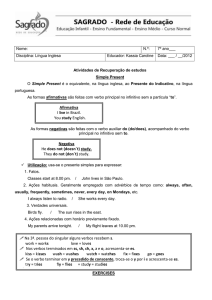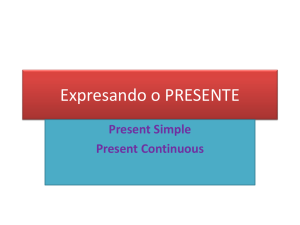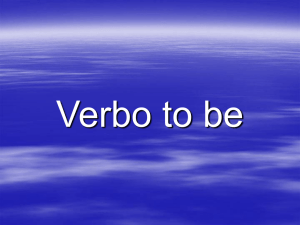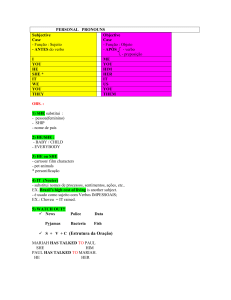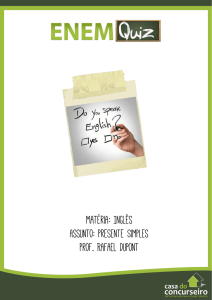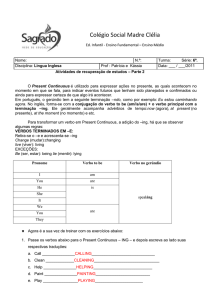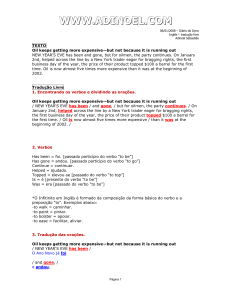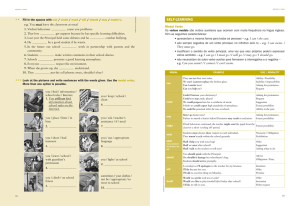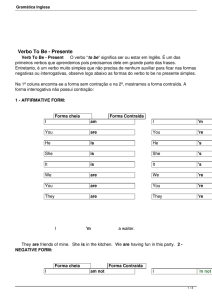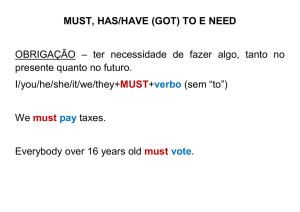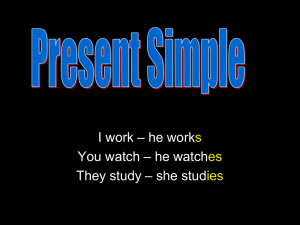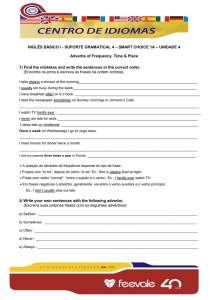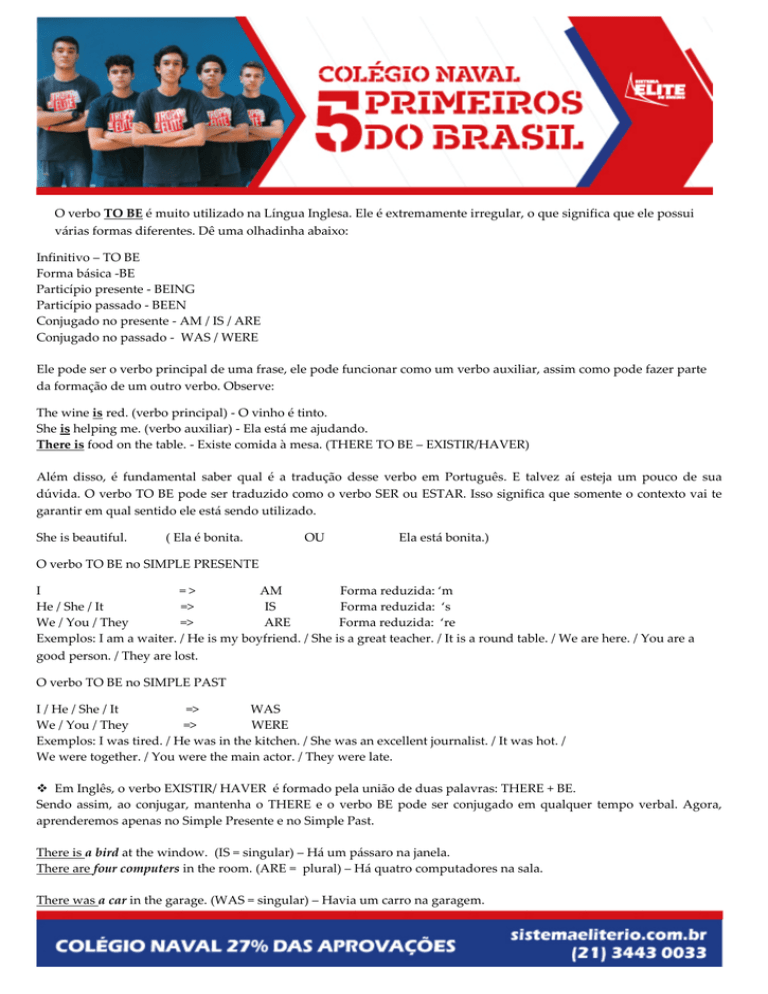
O verbo TO BE é muito utilizado na Língua Inglesa. Ele é extremamente irregular, o que significa que ele possui
várias formas diferentes. Dê uma olhadinha abaixo:
Infinitivo – TO BE
Forma básica -BE
Particípio presente - BEING
Particípio passado - BEEN
Conjugado no presente - AM / IS / ARE
Conjugado no passado - WAS / WERE
Ele pode ser o verbo principal de uma frase, ele pode funcionar como um verbo auxiliar, assim como pode fazer parte
da formação de um outro verbo. Observe:
The wine is red. (verbo principal) - O vinho é tinto.
She is helping me. (verbo auxiliar) - Ela está me ajudando.
There is food on the table. - Existe comida à mesa. (THERE TO BE – EXISTIR/HAVER)
Além disso, é fundamental saber qual é a tradução desse verbo em Português. E talvez aí esteja um pouco de sua
dúvida. O verbo TO BE pode ser traduzido como o verbo SER ou ESTAR. Isso significa que somente o contexto vai te
garantir em qual sentido ele está sendo utilizado.
She is beautiful.
( Ela é bonita.
OU
Ela está bonita.)
O verbo TO BE no SIMPLE PRESENTE
I
=>
AM
Forma reduzida: ‘m
He / She / It
=>
IS
Forma reduzida: ‘s
We / You / They
=>
ARE
Forma reduzida: ‘re
Exemplos: I am a waiter. / He is my boyfriend. / She is a great teacher. / It is a round table. / We are here. / You are a
good person. / They are lost.
O verbo TO BE no SIMPLE PAST
I / He / She / It
=>
WAS
We / You / They
=>
WERE
Exemplos: I was tired. / He was in the kitchen. / She was an excellent journalist. / It was hot. /
We were together. / You were the main actor. / They were late.
Em Inglês, o verbo EXISTIR/ HAVER é formado pela união de duas palavras: THERE + BE.
Sendo assim, ao conjugar, mantenha o THERE e o verbo BE pode ser conjugado em qualquer tempo verbal. Agora,
aprenderemos apenas no Simple Presente e no Simple Past.
There is a bird at the window. (IS = singular) – Há um pássaro na janela.
There are four computers in the room. (ARE = plural) – Há quatro computadores na sala.
There was a car in the garage. (WAS = singular) – Havia um carro na garagem.
There were pens in the drawer. (WERE = plural) – Havia canetas na gaveta.
PS.: Em Português, é muito comum usarmos o verbo TER de modo informal para falar “Tem água na geladeira.” ou
“Tem maças na cesta.” Em Inglês, nesses casos, precisamos usar o verbo THERE TO BE. There is water in the fridge. /
There are apples in the basket.
Não usem o verbo HAVE (TER) porque você estaria construindo uma frase errada.
Hands on !
1. Complete com o AM / IS / ARE:
a) I ______ student.
b) Lisa ______ happy.
c) Dennis ______ a boy.
d) It ______ a dog.
e) You ______ babies.
f) My cousins ______ soccer players.
3. Complete com WAS / WERE:
a) I ______ chubby.
b) We ______ at school.
c) They ______ at the airport.
d) The children ______ in the car.
e) Michael Jackson ______ a brilliant artist.
f) Sheila ______ sick.
4. Traduza as frases abaixo:
a) There is a big tree in the garden.
b) There are toys on the floor.
c) There was a hole in the street.
d) There were presents on the bed.
e) There is money in the wallet.
f) There were cellphones here.
2. Reescreva as frases usando a forma
reduzida dos verbos.
a) It is cold today.
b) I am at home now.
c) They are Korean.
d) There is a book on the desk.
e) We are from Ukraine.
f) You are sad.
Leia o texto abaixo e marque (V) ou (F) de acordo com o texto. Corrija as falsas.
This is John Smith. He’s Colombian but he lives in Brazil. He is a prisoner. Mr Smith is 33 years
old. He doesn’t work or study. Mr Smith cannot read or write but he can play the guitar very
well. He plays the guitar every day at 6:30 pm after dinner. The other prisoners all like his
music. Mr Smith likes POP ROCK but he doesn’t like SAMBA. Mr Smith likes Brazilian food
and drinks…He loves brown chocolate but he doesn’t like white chocolate. His room number in
the prison is 333 on the 3rd floor. People call Mr Smith "The Music Man". Mr Smith is a happy
prisoner. He wakes up at 5:15am and has breakfast; he eats very much!!! He has black coffee
and bread in the morning but he doesn’t eat fruit or drink milk. He smokes very much!!!
1. John is Brazilian. ( )
2. John plays the guitar after dinner. (
)
3. Mr. Smith has white chocolate in the morning. (
4. Mr. Smith is a sad prisoner. ( )
5. Mr. Smith smokes a lot. ( )
)

